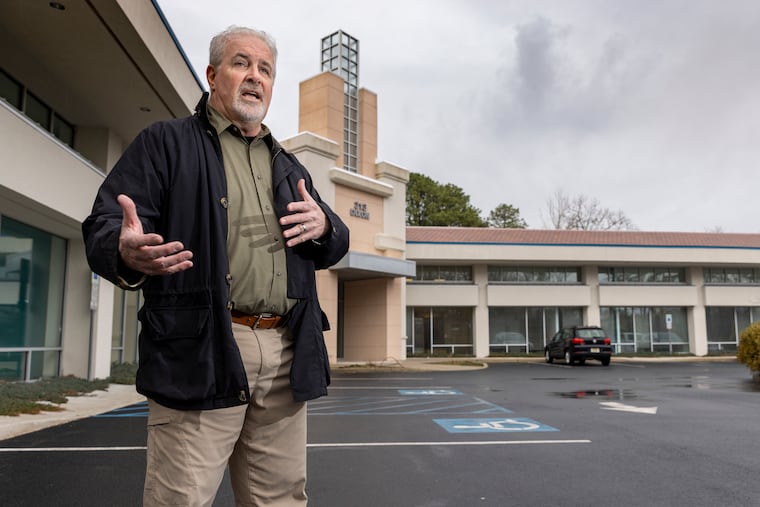How a South Jersey town tried to block alternative school for students derided by mayor as ‘worst of the worst’
The school sparked a bitter feud that divided the sprawling suburban communities and a contentious civil lawsuit alleging racial discrimination.

When real estate developer Kevin Dixon decided to convert his South Jersey property into an alternative school for troubled students from Atlantic City, he started losing friends.
The plan also sparked a bitter disagreement among neighbors in the sprawling suburban Galloway Township communities and a racial discrimination lawsuit filed by Dixon against the township that landed in federal court in Camden.
Dixon, a longtime resident and former township engineer, found himself at odds with Galloway officials after deciding in September 2020 to lease a building to Camelot Educational Resources, a Texas-based firm that planned to enroll about 90 students, mostly Black and Latino from Atlantic City and Pleasantville, under a $2.3 million contract with the Atlantic City school district to create Sea Shore Learning Academy.
“I was very proud to bring this school to the community,” Dixon said. “I knew this was the right organization, the right thing to do.”
But the project derailed after pushback from officials and residents in the predominantly white town of nearly 36,000. At a meeting last October with Dixon, then-Mayor James Gorman told him the prospective students “were the worst of the worst,” court records show. And a month later, residents who spoke out at a heated Nov. 9 council meeting called the students “dangerous, disturbed,” and “trash coming into my town.” After the meeting, the township solicitor instructed the town’s code official to issue stop permits on the project.
Now, after U.S. District Judge Robert Kugler ruled in January that township officials’ actions were discriminatory, a preliminary injunction he issued has blocked officials from trying to further thwart the school. Dixon said the school is now scheduled to open in a few weeks.
”The only rational conclusion that one can draw from this sordid episode was that the town officials were desperately seeking a way to halt the opening of the school because of pressure from the residents,” Kugler wrote. “The reason for that pressure is not complimentary to the township and its residents.”
Built in 2008, the two-story L-shaped building where Dixon once housed his engineering business had been mostly vacant from the start.
After obtaining construction permits, Dixon pumped $1.7 million into renovating the 17,160-square-foot building, creating 10 classrooms, an all-purpose room, a nurse’s office, and administrative offices. Located in a commercial strip on a busy stretch of Jimmie Leeds Road, the school was scheduled to open this past January under a six-year, $350,000 annual lease.
But then came the October meeting where Gorman called the students “the worst,” a comment Gorman did not dispute making, according to court papers, but he did add he was unaware of the race of the students. Kugler said it was widely documented many of the students would come from Atlantic City, where the population comprises mostly people of color.
”This is a sorely needed school,” Kugler wrote in his ruling. “It is not a maximum-security prison which would raise security concerns in the community.”
At the Nov. 9 meeting, a resident asked how to obtain a gun permit and warned, “I’m not going to put up with it.” Others penned their frustration on social media. “There goes the neighborhood, folks,” wrote one resident. A few said they were embarrassed by the negative reaction to the school.
”I really can’t believe so many people are against a good for children,” one wrote.
Then-Police Chief Donna Higbee, who retired in March after 25 years on the force, said she was concerned about public safety. She cited at the meeting another alternative school in the county, which she said generated 71 police reports of assaults, weapons, and drug possession.
» READ MORE: First female police chief in Atlantic County wants to open doors for other women
”Someone needs to be looking out for what’s coming to this town,” said Higbee, who was named in the lawsuit along with Gorman, the township, its manager, solicitor, and construction official.
“Their goal was simple: to prevent underserved Black and Latino students from attending the school in Galloway Township,” Dixon’s attorney, Paul Fishman, wrote in the lawsuit, filed in December.
Gorman declined to comment when reached by phone this week. Higbee and Todd Gelfand, the township’s attorney, did not respond to messages.
Current Mayor Anthony Coppola, who succeeded Gorman in January, declined comment, citing the pending lawsuit.
Atlantic City Mayor Marty Small responded the day after the contentious November meeting at a news conference, saying, according to the lawsuit, the actions meet the definition of “racial profiling if I ever saw it.”
The incoming Sea Shore students, from grades six to 12, have been learning virtually since 2020, said Milton Alexander, deputy superintendent for Sea Shore. The school has about 24 teachers and support staff, he said.
Construction crews are putting the final touches on Dixon’s building, installing waterlines to the property for the sprinkler system. Inside, desks and equipment are lined up in classrooms with robin’s egg-colored walls.
Dixon plans to be there when the school opens.
“It’s been a long journey,” Dixon said. “These kids have needed a place.”